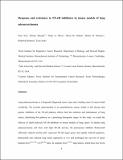Response and Resistance to NF-κB Inhibitors in Mouse Models of Lung Adenocarcinoma
Author(s)
Xue, Wen; Meylan, Etienne; Oliver, Trudy; Feldser, David M.; Winslow, Monte Meier; Bronson, Roderick T.; Jacks, Tyler E.; ... Show more Show less
Downloadmain article (1.346Mb)
OPEN_ACCESS_POLICY
Open Access Policy
Creative Commons Attribution-Noncommercial-Share Alike
Terms of use
Metadata
Show full item recordAbstract
Lung adenocarcinoma is a leading cause of cancer death worldwide. We recently showed that genetic inhibition of the NF-κB pathway affects both the initiation and the maintenance of lung cancer, identifying this pathway as a promising therapeutic target. In this investigation, we tested the efficacy of small-molecule NF-κB inhibitors in mouse models of lung cancer. In murine lung adenocarcinoma cell lines with high NF-κB activity, the proteasome inhibitor bortezomib efficiently reduced nuclear p65, repressed NF-κB target genes, and rapidly induced apoptosis. Bortezomib also induced lung tumor regression and prolonged survival in tumor-bearing KrasLSL-G12D/wt;p53flox/flox mice but not in KrasLSL-G12D/wt mice. After repeated treatment, initially sensitive lung tumors became resistant to bortezomib. A second NF-κB inhibitor, Bay-117082, showed similar therapeutic efficacy and acquired resistance in mice. Our results using preclinical mouse models support the NF-κB pathway as a potential therapeutic target for a defined subset of lung adenocarcinoma.
Significance: Using small-molecule compounds that inhibit NF-κB activity, we provide evidence that NF-κB inhibition has therapeutic efficacy in the treatment of lung cancer. Our results also illustrate the value of mouse models in validating new drug targets in vivo and indicate that acquired chemoresistance may later influence bortezomib treatment in lung cancer.
Date issued
2011-08Department
Massachusetts Institute of Technology. Department of Biology; Koch Institute for Integrative Cancer Research at MITJournal
Cancer Discovery
Publisher
American Association for Cancer Research
Citation
Richardson, Claire E., Tristan Kooistra, and Dennis H. Kim. “An essential role for XBP-1 in host protection against immune activation in C. elegans.” Nature 463 (2010): 1092-1095.
Version: Author's final manuscript
ISSN
2159-8290
2159-8274